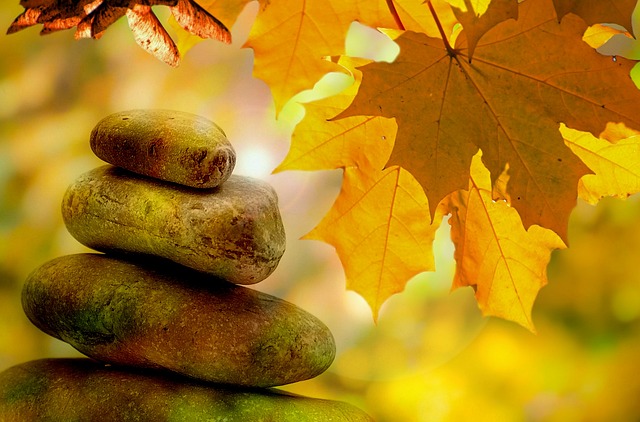Wellness practices are key to enhancing resilience and managing stress effectively. Mindfulness techniques and yoga exercises promote calmness and mental clarity, while meditation practices help maintain emotional balance. A balanced diet rich in whole foods supports energy levels and overall health, and regular physical activity releases endorphins that boost mood. Deep breathing exercises offer quick stress relief by triggering the body's natural relaxation response. Gratitude journaling shifts focus to positive aspects of life, fostering thankfulness and contentment. Tailored self-care routines ensure personal wellness nurturing. By integrating these strategies—mindfulness, yoga, meditation, healthy eating, physical activity, deep breathing, gratitude, and self-care—individuals can navigate life's complexities with greater ease, resilience, and inner strength. These practices collectively support a holistic approach to stress management and overall wellbeing.
When navigating life’s inevitable challenges, the ability to bounce back with strength and composure is invaluable. This article delves into transformative techniques for cultivating resilience and managing stress through wellness practices, mindfulness, yoga, and meditation. By integrating these strategies into your daily routine, you can enhance your mental fortitude, ensuring you’re equipped to handle life’s pressures with grace and poise. Explore the synergy between healthy eating habits, regular physical activity, deep breathing exercises, gratitude journaling, and self-care routines—all pivotal components in the pursuit of resilience and stress management. Embark on this journey to discover how mindfulness techniques can serve as a pathway to inner strength, yoga exercises can promote mental flexibility, and meditation practices can cultivate calm and clarity amidst life’s chaos. With these tools at your disposal, resilience becomes not just a response to tough times but a lifestyle that empowers you to thrive.
- Embracing Wellness Practices for Enhanced Resilience
- – Discuss the role of wellness practices in fostering resilience
- – Highlight various wellness activities, including yoga, meditation, and mindfulness
- – Explain how these practices can be integrated into daily life to manage stress effectively
Embracing Wellness Practices for Enhanced Resilience

Integrating wellness practices into daily life can significantly enhance resilience and manage stress effectively. Mindfulness techniques, such as focusing on the present moment, can cultivate a more calm and centered mind, allowing individuals to respond to challenges with greater composure. Yoga exercises, which combine physical postures, breathing techniques, and meditation, offer a holistic approach to stress management by promoting flexibility, strength, and balance both mentally and physically. Similarly, consistent meditation practices encourage a state of relaxation and clarity, enabling the mind to detach from distressing thoughts and emotions. Healthy eating habits that prioritize whole foods, nutrients, and hydration provide the body with the necessary fuel to maintain energy levels and support overall well-being.
Incorporating deep breathing exercises into your routine can act as a rapid stress reliever by activating the body’s relaxation response. Gratitude journaling is another powerful practice that shifts focus from negative experiences to positive aspects of life, fostering an attitude of thankfulness and contentment. Establishing self-care routines tailored to individual needs ensures ongoing personal care, nurturing both mental and physical health. Regular physical activity, whether it be brisk walking, cycling, or swimming, releases endorphins that improve mood and reduce stress. By weaving these wellness practices into the fabric of your lifestyle, you create a resilient framework to navigate life’s ups and downs with greater ease and inner strength.
– Discuss the role of wellness practices in fostering resilience

Engaging in wellness practices is a pivotal approach to cultivating resilience and managing stress effectively. Mindfulness techniques, such as yoga exercises, encourage a heightened awareness of one’s physical and mental state, fostering an environment where individuals can better navigate challenges. These exercises not only enhance flexibility and strength but also promote a sense of calmness and focus, which is essential for maintaining emotional balance. Additionally, incorporating meditation practices into daily routines can significantly improve one’s ability to respond to stressors with composure rather than react impulsively. By training the mind to be present in the moment, individuals can disrupt patterns of overthinking that often lead to heightened stress levels.
Stress management strategies encompass a broad range of activities that contribute to overall well-being. Healthy eating habits provide the body with the nutrients required to operate at its optimal level, which in turn supports mental clarity and resilience. Regular physical activity, from brisk walks to high-intensity workouts, releases endorphins that can help alleviate stress. Deep breathing exercises, a simple yet powerful tool, can activate the body’s relaxation response, helping to slow heart rate and lower blood pressure. Further, gratitude journaling and self-care routines are effective in shifting one’s perspective towards appreciation and away from negative thought patterns. These practices not only enhance personal resilience but also contribute to a more positive outlook on life’s challenges.
– Highlight various wellness activities, including yoga, meditation, and mindfulness

Integrating wellness practices into daily life can significantly enhance resilience and manage stress effectively. For instance, yoga exercises are not merely physical routines but also foster a deep connection with one’s breath and body, promoting mental clarity and emotional balance. Similarly, mindfulness techniques encourage individuals to be fully present, which can be achieved through various forms of meditation practices that cultivate a state of calmness and focus. These practices, when combined with healthy eating habits that prioritize nutrient-dense foods and regular physical activity, create a robust foundation for stress management. Deep breathing exercises, an integral part of both yoga and meditation, can activate the body’s relaxation response and reduce the physiological effects of stress. Additionally, maintaining a gratitude journal is a powerful mindfulness technique that shifts focus from worries to appreciating life’s positive aspects, thereby nurturing a sense of contentment and well-being. Incorporating self-care routines tailored to individual needs can further support these efforts, ensuring that the body and mind receive the necessary care to thrive amidst life’s challenges. By weaving together these diverse strategies, individuals can enhance their resilience, manage stress more effectively, and maintain a harmonious balance between mental and physical health.
– Explain how these practices can be integrated into daily life to manage stress effectively

Incorporating wellness practices into your daily life can significantly enhance your ability to manage stress effectively. For instance, mindfulness techniques such as focusing on the present moment can be seamlessly woven into everyday activities, offering a pause from the chaos of life and allowing for a more calm and clear perspective. Yoga exercises not only improve flexibility and strength but also encourage a state of relaxation that can counteract the effects of stress. By dedicating time each day to engage in these physical movements, you create a sanctuary of tranquility within your routine. Similarly, meditation practices can serve as a powerful tool for stress management. Regular practice can lead to a more focused mind and a heightened sense of awareness, enabling individuals to navigate life’s pressures with greater composure.
Complementing physical practices with healthy eating habits and regular physical activity further fortifies your resilience against stress. A balanced diet rich in nutrients provides the necessary fuel for both body and mind, while consistent exercise releases endorphins that naturally uplift mood. In addition to these practices, deep breathing exercises can be employed throughout the day as an immediate stress reliever. This technique helps regulate the autonomic nervous system, promoting a state of relaxation and reducing tension. Lastly, maintaining a gratitude journal can shift your focus from negative to positive experiences, fostering a sense of contentment and a more optimistic outlook on life. Self-care routines, tailored to your personal needs, ensure that you are not only coping with stress but also nurturing your wellbeing holistically. These integrated strategies form a comprehensive approach to resilience and stress management, offering a multifaceted solution to maintain mental health and emotional equilibrium in the face of life’s challenges.
In concluding our exploration of resilience and stress management, it’s evident that incorporating wellness practices into one’s lifestyle is a multifaceted approach to strengthening mental fortitude. Engaging in mindfulness techniques such as yoga, meditation, and deep breathing exercises can serve as cornerstones for stress management. These practices, when consistently practiced, complement healthy eating habits and regular physical activity, fostering an environment where resilience naturally flourishes. Additionally, keeping a gratitude journal and adhering to self-care routines are effective in maintaining a balanced perspective amidst life’s challenges. By integrating these stress management strategies into daily living, individuals can enhance their capacity to navigate adversity with composure and confidence. Embracing wellness is not just a journey toward better health but also a vital step in cultivating resilience for a more robust and fulfilling life.
